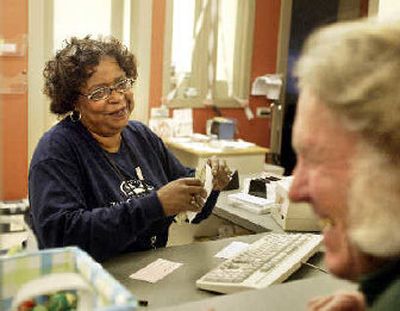Bank offers real interest

SEATTLE — Wearing secondhand clothes and achy from a poor night’s sleep in shelters, customers line up at the city’s first and only bank for the homeless, believed to be among only a few of its kind in the country.
“How much money do I have?” Dave Willett, a 54-year-old with bushy gray sideburns, asked the bank teller. “I want to do some laundry today.”
Carol Staggers, the teller, gave him $15 of the $29 he had in savings and reminded him the Compass Center has a laundry service downstairs.
Willett is one of about 2,000 customers with open accounts at the Compass Center’s bank, which offers free mailboxes and basic financial services, including check cashing, direct deposits, savings accounts and, for a smaller number, bill-paying arrangements.
Founded in 1920 by a Lutheran minister, the Compass Center once served as a depository for loggers and fishermen. Over the years, it evolved into a homeless-services center with two overnight shelters and 136 beds in transitional housing.
In the late 1980s, the center began keeping clients’ cash in a shoebox to help guard against street crime. That developed into a two-window counter with a sophisticated accounting system and a safe.
“We are meeting an unmet need,” said Kim Sather, manager of the center’s shelter and day services. “It’s plain when people don’t feel welcome in the lobby of a mainstream bank. Here, we notice when they don’t show up to get their mail or if they look a little disheveled at the counter. It’s a normal, daily contact that is a little less scary than a mainstream bank may be.”
The banking comes with a bit of social work. Staggers and the other tellers also are case managers for their customers.
The homeless aren’t the only ones disconnected from mainstream financial institutions. The federal Survey of Consumer Finances estimates that nearly one in 10 households is “unbanked.”
Alternatives to programs like the Compass Center are usually “fringe services” like payday loan shops, said Jim Carr, vice president for research at the Fannie Mae Foundation, which describes itself as the largest foundation in the country devoted to affordable housing and the revitalization of communities.
Mainstream banks are beginning to see people without banks as an untapped market, Carr said. The Compass Center has gotten help from one of those banks.
In 2000, a team from the Commerce Bank of Washington was doing volunteer painting at the Compass Center when someone noticed the center’s bank, which was run out of a cash register at the time.
Commerce Bank helped the center get its own routing number for direct deposits and a special waiver from the federal Comptroller of the Currency, under which the homeless bank is treated as a Commerce Bank branch.
Ron Lynch, Commerce’s vice president, said the partnership helps Compass’ clients budget their monthly Social Security or Veterans Affairs checks.
“It’s a very predatory environment they’re in, and if they have to cash it at a check-cashing place, it’s very hard to make that last until the next month,” Lynch said.
Staggers, was homeless eight years ago, and has been in recovery from drug addiction for almost nine years. She worked her way up at Compass from a janitor.
She knows the difficulty of the street life, and she knows how hard it is to rise above it. “You want to do more,” she said of the bank’s clients. “But you have to draw boundaries with the clients. It’s hard to forget it when you go home.”